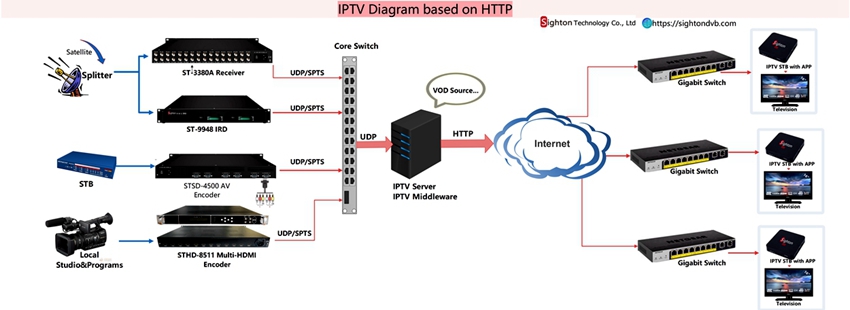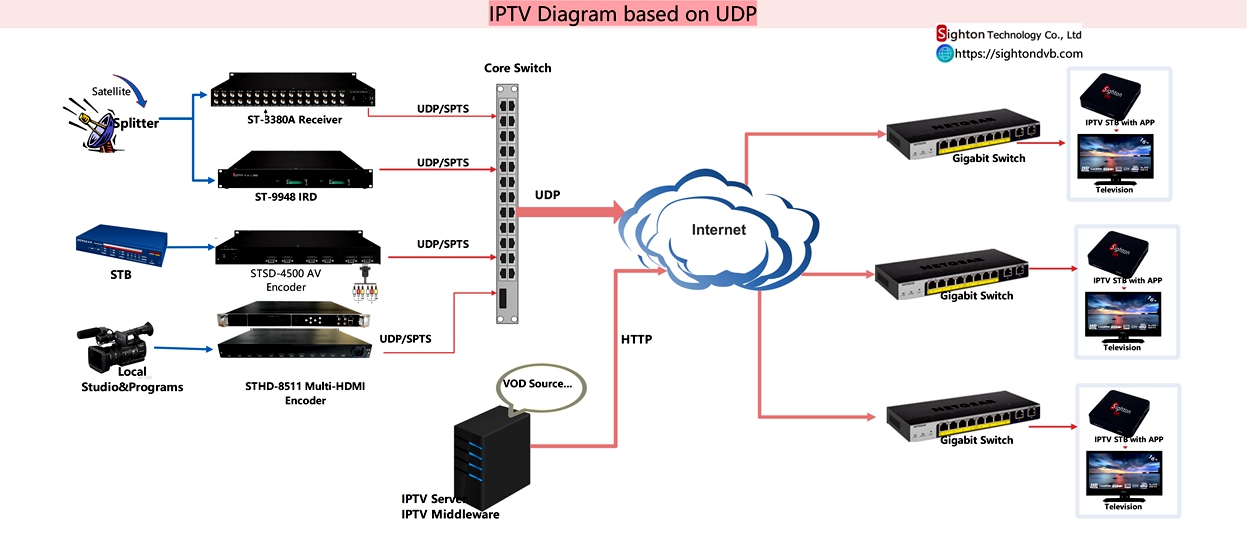
Table of Contents
1.1 What are the features of IPTV Hotel?
2. Network and System Stability
In today's highly connected world, it has become crucial for hotels to offer a seamless entertainment experience to their guests. Integrating an Internet Protocol Television (IPTV) system within a hotel's infrastructure is an efficient way to deliver rich media content, providing guests with a personalized and unique experience. However, building your own IPTV hotel solution can be a complex and challenging task, since multiple factors must be taken into consideration to ensure high-quality service and to meet your customers' ever-evolving demands.
When we consider whether to build our own IPTV hotel, we must first consider whether the IPTV features can meet our business needs. Compared with cable TV systems for hotels, IPTV hotel provides the following functions that cable TV cannot provide.
Click here to read the details:
Another advantage of IPTV is its capability to integrate with other hotel systems. For example, it can be linked to a property management system (PMS) for seamless guest billing, making it easier for hotels to manage their operations.
What is the benefit of integrated PMS with IPTV?
How to integrate IPTV with hotel PMS?
Before purchasing IPTV hardware equipment and middleware, it is necessary for you to test IPTV hotel features in advance so that we can intuitively see the various functions it can provide and it will help us make the right decision.
Step1. STB/Android TV install APK via USB.
Click here to download the latest APK installation package
Step2. Configure the set-top box/Android TV network IP, so that the set-top box/Android TV can access the Internet normally.
Step3. Open the smart hotel APP, enter the main interface of the APP, press the button on the remote control, the combination key of up, down, down, or 111999, and you can enter the background setting interface.
Step4. Change the server address to: 114.50.200.76, the server port to 18030
operation guide video
a. Whether the APK can be automatically launched after booting.
b. Whether the broadcast program is smooth.
c. Is the table switching delay acceptable?
d. Whether VOD on-demand can be implemented.
e. All pictures are displayed normally.
Cloud platform hotel background login address
http://114.55.200.76:18030/iptv2
Username and password: admin/123456
Ensuring network and system stability is a critical factor when building an IPTV hotel. A stable network provides a seamless viewing experience for hotel guests while minimizing buffering, interruptions, and other technical issues.
One important aspect to consider is network redundancy. Implementing redundant networks helps to ensure the system remains operational in case of a primary network failure. This can be achieved by adding multiple layers of backup, such as secondary internet connections, alternative power sources, and redundant server architecture. Redundancy not only provides a sense of confidence in the system but also caters to the needs of guests by delivering uninterrupted services.
Another crucial element is the reduction of buffering time. Buffering can be frustrating and detrimental to user experience, especially for real-time content such as live events and sports. To minimize buffering, invest in a high-performance network infrastructure that can handle heavy traffic loads and content delivery. An efficient content delivery network (CDN) helps reduce latency and improve content streaming quality.
Real-time monitoring of the system is essential to maintain its stability. Constant monitoring can detect potential issues ahead of time and prevent them from escalating. By identifying areas that require enhancement, hotel management can make informed decisions and improve the IPTV system’s overall performance.
In conclusion, network and system stability are crucial for a successful IPTV hotel implementation. Implementing network redundancy, minimizing buffering, and using real-time monitoring can significantly enhance the viewing experience for hotel guests and maintain a reliable system.
If you just buy some boxes from an IPTV streamer provider, they tell you to just connect to the Internet, you would get all the functions of IPTV. Then please be careful. You are most likely to face the following problems:

If you build your own IPTV system based on UDP, it works in the LAN and doesn't rely on the Internet. So there will be no buffering problem.
For HLS networking, what we need to ensure is the bandwidth of the internet.
click here to see How to set up your own IPTV network?
IPTV's requirements for network bandwidth are related to the number of programs and end users.
This relationship needs to be determined by the IPTV networking method. Generally, it is comprehensively considered based on the number of terminals and the size of the project.
There are roughly two networking methods for IPTV, unicast HLS and multicast UDP/RTP.
Like ordinary hotels, those with terminals below 1,000 basically use unicast HLS. At this time, the bandwidth is determined by the number of terminals online and the bit rate of the program being watched.
Bandwidth=Enduser* Bitrate of channel
Assuming that there are actually 800 online users watching the same 5M live broadcast program, the bandwidth is 800*5=4G, then the server needs to be configured with a 10G optical port output.

Another multicast method is aimed at large users, thousands or tens of thousands of end users, such as community IPTV. This comparison saves bandwidth.

Bandwidth=Live channels* Bitrate of each channel
The maximum bandwidth is the sum of the bit rates of all programs. For example, there are 50 channels of live broadcast programs, each channel is 5M, 50*5=250M. Since the intermediate switch has IGMP control code flow, the bandwidth at each customer is 5M.
When building your own IPTV system for a hotel, one major factor to consider is the cost of building the IPTV system. This includes the hardware and software needed for the infrastructure. It's essential to determine whether these costs are within your budget and whether the initial investment will result in a long-term return on investment.
Click here to compare How much does an IPTV cost(as a subscription member)?
Subscription models, bear in mind, that they may not provide the same level of customization, integration, and control that an IPTV system offers, which can be particularly important for a hotel environment.
What is the one-time investment cost for building an IPTV system?
Which devices would be purchased for building your Hotel's own IPTV system?

If you choose an IPTV server that integrates hotel IPTV middleware, you don’t need to purchase additional software. Beside of server, we also need
IPTV streamer ( encoder or receiver) and IPTV Box or APP on the terminal.
Another significant aspect to evaluate is the revenue model. Typical revenue increases mainly come from the following 3 categories:
A. Paid programs: live broadcast on demand
B. Advertising: Attract customers to place orders through scrolling text ads, pictures, or hotel-made videos
C. Online payment for hotel services: dinner ordering, item rental, laundry service, wake-up service, SPA and surrounding tourist attraction recommendations, scenic spot ticket purchase, etc.
Place orders quickly and directly from your TV screen
The hotel's PMS needs to be integrated with IPTV. Here it requests IPTV middleware supplier provide an integration solution with the hotel.
What is the benefit of integrated PMS with IPTV?
How to integrate IPTV with hotel PMS?
Related IPTV Articles:
How do I test IPTV Middleware before buying it?